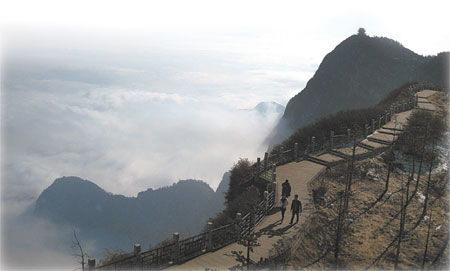
I thought my wife was rummaging through my backpack, but instead found myself nose-to-nose with a glowering Tibetan macaque.
The woolly monkey was up to his armpit in my bag, rooting through clumps of socks and sweaters to pilfer the peanuts stashed inside.
"Hey, that's mine!" I scolded, laughing, and tugged the knapsack away from the creature - or at least tried to. These cheeky Tibetan macaques have surprisingly powerful upper body strength.
The primates who dwell on the mountainsides of Sichuan province's Emei Mountain are colloquially known as "little beggars". That's why I'd brought alms of peanuts. But nobody said they were actually "little pickpockets".
It was an Oliver Twist meets Planet of the Apes tableau - but one set on a sacred Buddhist mountainside in China.

My family and I were trudging toward Emei's second-highest peak, the 3,079-m-high Golden Summit. The range's tallest crown is Qianfoshan (Thousand Buddha Mountain), which zooms 3,099 m into the sky.
Lashed around our shoes were bingjiao (ice paws), iron spikes locals wear to puncture the slush to keep from slithering down the mountainside. The way Emei Mountain's precipices jut skyward seems to wave a defiant finger in the face of Newtonian physics, while tapping another finger on climbers' shoulders as if to say: "You really don't want to fall down me."
Slogging brought us to the cable car that zips 1.164 km through a spray of aerosol known as the Mist of Leidong Plateau - one of the four "miracles of Emei". The car carries 100 passengers above the clouds within five minutes, and despite the route's distance, there are no supports along the way.